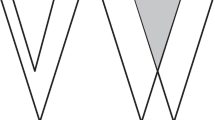Abstract
I argue that we need not accept Quine's holistic conception of mathematics and empirical science. Specifically, I argue that we should reject Quine's holism for two reasons. One, his argument for this position fails to appreciate that the revision of the mathematics employed in scientific theories is often related to an ‘expansion’ of the possibilities of describing the empirical world, and that this reveals that mathematics serves as a kind of rational framework for empirical theorizing. Two, this holistic conception does not clearly demarcate pure mathematics from applied mathematics. In arguing against Quine, I present a formal account of applied mathematics in which the mathematics employed in an empirical theory plays a role that is analogous to the epistemological role Kant assigned synthetic a priori propositions. According to this account, it is possible to insulate pure mathematics from empirical falsification, and there is a sense in which applied mathematics can also be labeled as ‘a priori’.
Similar content being viewed by others
References
Brittan, G.: 1978, Kant's Theory of Science, Princeton University Press, Princeton, New Jersey.
Drake, S.: 1978, Galileo at Work, University of Chicago Press, Chicago, Illinois.
Field, H.: 1980, Science Without Numbers: A Defense of Nominalism, Princeton University Press, Princeton, New Jersey.
Friedman, M.: 1983, Foundations of Space-Time Theories, Princeton University Press, Princeton, New Jersey.
Holland, R.: 1992, ‘Kant, Reichenbach and Aprioricity’, Philosophical Studies 66, 209–33.
Kant, I.: 1929, Critique of Pure Reason, trans. by Norman Kemp Smith, St. Martin's Press, New York.
Kant, I.: 1953, Prolegomena to Any Future Metaphysics, trans. by Peter Lucas, Manchester University Press, Manchester.
Krantz, D. H., R. D. Luce, P. Suppes and A. Tversky (eds.): 1971, Foundations of Measurement, Vol. 1, Academic Press, New York.
Malament, D.: 1982, Review of H. Field's Science Without Numbers, The Journal of Philosophy 79, 523–34.
Putnam, H.: 1978, ‘There is at Least One A Priori Truth’, Erkenntnis 13, 153–70.
Quine, W. V.: 1969, Word and Object, MIT Press, Cambridge, Massachusetts.
Quine, W. V.: 1970, Philosophy of Logic, Harvard University Press, Cambridge, Massachusetts.
Reichenbach, H.: 1960, The Theory of Relativity and A Priori Knowledge, trans. by Maria Reichenbach, University of California Press, Berkeley, California.
Sober, E.: 1981, ‘Revisability, A Priori Truth, and Evolution’, Australasian Journal of Philosophy 59, 68–85.
Suppes, P. and D. Scott: 1958, ‘Foundational Aspects of Theories of Measurement’, The Journal of Symbolic Logic 23, 113–28.
Tiles, M.: 1984, ‘Mathematics: The Language of Science?’, The Monist 67, 3–17.
Author information
Authors and Affiliations
Additional information
I am especially indebted to Michael Friedman for his valuable suggestions and criticisms of this paper. I would also like to thank Mark Wilson, Anil Gupta, and Arthur Fine for their comments and encouragement.
Rights and permissions
About this article
Cite this article
Holland, R.A. Apriority and applied mathematics. Synthese 92, 349–370 (1992). https://doi.org/10.1007/BF00414287
Issue Date:
DOI: https://doi.org/10.1007/BF00414287




